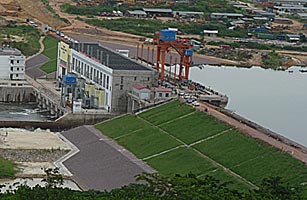
Much of the cost of building the Imboulou dam in Congo, above, was provided by the Chinese. Approximately 400 Chinese construction workers have been involved
With an enormous delegation of top Chinese business leaders in Cape Town, it was hardly surprising that the role of China in Africa's economic development should have emerged as a key topic at the Fortune/TIME/CNN Global Forum 2010.
As Trevor Manuel, South African Minister in the Presidency and former Finance Minister, reminded the conference attendees, Chinese investment in Africa is hardly new — the famous Tan-Zam railroad, designed to take Zambian ore to the coast in Tanzania, was funded by the Chinese as long ago as the 1970s. But the scale of recent Chinese investment in Africa — encompassing everything from resource extraction to agriculture to finance (China's ICBC owns 20% of South Africa's Standard Bank, for example) has been extraordinary, making sessions on China at the forum a palpable hit. It wasn't just Chinese investment that won the attention of delegates, however. It was also the sense that China — with its enormous parastatal companies and strategic direction of the economy by state agencies — offers an alternative model for growth to the market fundamentalism that, as economist Ken Courtis argued, had held sway since the collapse of the Bretton Woods world some 30 years ago.
The problem, of course, is that it is easier to say you want to be a China-style "development state" than to actually be one. Africa's boosters here may insist that standards of governance and statecraft are improving on the continent, but, to put it charitably, they rarely reach the level of efficient program delivery so evident in China.
Nonetheless, it's clear that China — and China's lessons — are in Africa to stay. Africa's status as a "treasure chest" of resources, as Courtis put it, is simply too important for China, with its insatiable demand for commodities, to ignore. And China can bring a lot more than money to the table. Its best companies, like the telecom giant China Mobile, have significant experience delivering services to the developing world — not in Africa, but in China's poor rural areas and western provinces.
Is China's role in Africa welcomed by locals? Despite some oft-repeated stories of occasional Chinese high-handedness in Africa, my impression from attendees at the forum was an overwhelming yes. But wise observers of Africa still feel it incumbent to caution Chinese companies on the proper way to behave in Africa, and on the need to avoid the mind-set of Africa's rapacious colonialists long ago. China in Africa, said philanthropist and former telecom executive Mo Ibrahim, "should start from where the West ended — not from where the West started."